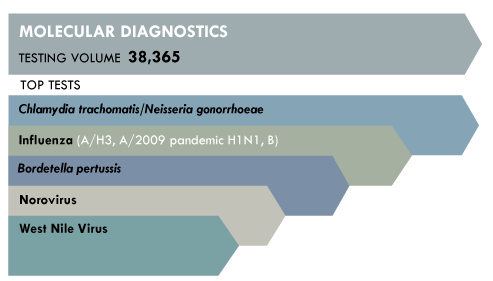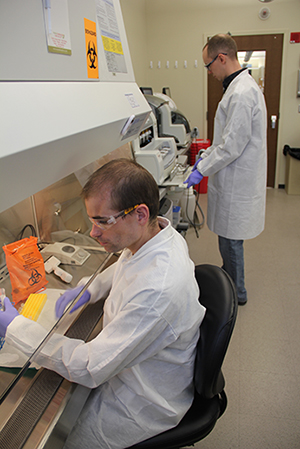DIVISION
Molecular Diagnostics
The field of molecular diagnostics is the gold standard for rapid, sensitive and specific detection of bacteria and viruses that cause disease. The Hygienic Laboratory’s menu of molecular tests targets diseases of public health significance. This section participates in several statewide surveillance programs in conjunction with the Iowa Department of Public Health, most notably for chlamydia and gonorrhea screening for the Iowa Infertility Prevention Program. It also performs annual influenza testing to identify those isolates circulating throughout the state and to determine if the strains of virus circulating are a match for the current vaccine.
The vast majority of reported gastroenteritis outbreaks in Iowa are caused by norovirus. The Hygienic Lab, as the state’s designated laboratory, rapidly responds to outbreaks in support of IDPH state investigators to create optimal remediation and prevention strategies.
Whooping cough (pertussis) is a reportable disease and an important illness in school-aged children. The laboratory’s Molecular section performs the majority of testing in the state. Results are transmitted electronically to appropriate state and local health departments for swift intervention.


Major achievements:
- Completed a multi-year project with Iowa Department of Public Health to electronically deliver all laboratory results of “public health significance.” Because of this program, public health intervention can begin sooner, ongoing exposure is reduced, and infections and subsequent illnesses are minimized. Through collaborations with Association of Public Health Laboratories, CDC and other agencies, the Hygienic Laboratory developed the uniform capabilities to deliver results when testing suspicious substances and clinical isolates.
- Designed and developed applications unique to public health laboratories such as the Laboratory Information Management System. This collaborative work with several state public health laboratories created an open source enterprise system that integrates various disparate systems, enhancing the efficiency of both the Hygienic Laboratory and its clients.